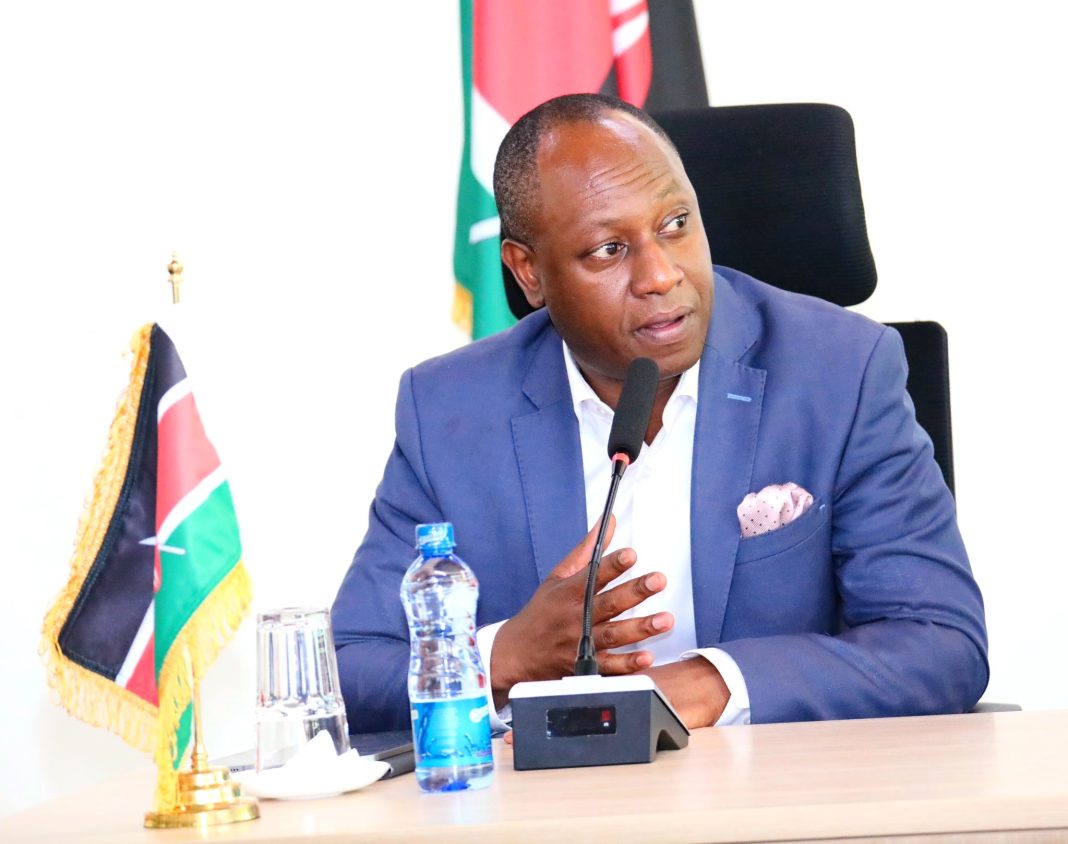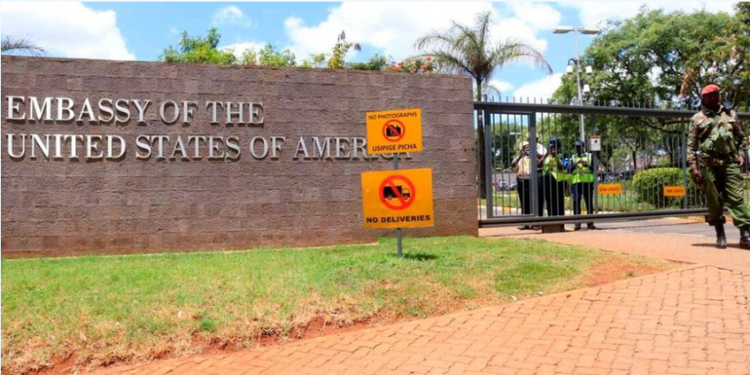The Ministry of Agriculture is set to introduce an electronic voucher system to boost livestock vaccination and strengthen disease monitoring across the country.
Livestock Development Principal Secretary Jonathan Mueke said the program will first be piloted in regions with large livestock populations and frequent outbreaks of foot-and-mouth disease (FMD), anthrax, and other transboundary diseases.
“The system, which will be piloted in regions with high livestock populations and those prone to outbreaks of foot-and-mouth disease, anthrax, and other transboundary animal diseases, will enhance data-driven decision-making in the livestock sector,” Mueke stated during a tour of Maralal, Samburu County.
The e-voucher program is modelled on the government’s fertilizer distribution system, where farmers register through the Kenya Integrated Agriculture Management System (KIAMS) and receive digital vouchers via SMS or other platforms. These vouchers are redeemed at designated Agro-vet shops or depots. Officials hope to replicate this success in livestock vaccination, ensuring vaccines are distributed efficiently while centralizing data for disease surveillance.
Real-time monitoring and improved traceability
Authorities say the digital platform will allow real-time data collection in pilot counties, mapping vaccination coverage, identifying hotspots, and enabling quicker responses to outbreaks. The system will also create digital health records for livestock, improving herd management and traceability.
Mueke revealed that the government has already tested the platform in state-owned farms and is in discussions with county governments to facilitate immediate rollout.
“We are in talks with all county governments through respective livestock and veterinary departments to roll out the program immediately,” he said, stressing that piloting would refine the system before a national rollout.
Security and economic benefits
The platform will also support security agencies in tackling cattle rustling and reducing illicit livestock trade, which remain major challenges in pastoralist areas.
The government aims to vaccinate 22 million cattle and 50 million goats and sheep under the program. President William Ruto has backed the initiative, saying it is vital in eradicating foot-and-mouth disease and peste des petits ruminants (PPR).
Stakeholder pushback
Despite government assurances, the Kenya Veterinary Association (KVA) has opposed the mass vaccination plan, citing four major risks they believe warrant postponement.
Even so, officials maintain that the e-voucher system will improve efficiency, reduce wastage, and strengthen disease surveillance, while farmers will benefit from easier access to vaccines.







I am forever thought about this, thanks for posting.
An impressive share, I just given this onto a colleague who was doing a little analysis on this. And he in fact bought me breakfast because I found it for him.. smile. So let me reword that: Thnx for the treat! But yeah Thnkx for spending the time to discuss this, I feel strongly about it and love reading more on this topic. If possible, as you become expertise, would you mind updating your blog with more details? It is highly helpful for me. Big thumb up for this blog post!
I’d have to verify with you here. Which is not something I often do! I get pleasure from studying a publish that can make individuals think. Also, thanks for permitting me to comment!
I think that is one of the most important information for me. And i am happy reading your article. However should remark on some common issues, The website taste is perfect, the articles is in point of fact excellent : D. Just right process, cheers
Hello, Neat post. There is a problem with your website in web explorer, may check this?K IE nonetheless is the market leader and a good portion of other folks will pass over your fantastic writing due to this problem.
What i don’t understood is in fact how you’re not really much more smartly-liked than you might be right now. You’re very intelligent. You recognize therefore significantly in terms of this matter, produced me individually believe it from a lot of varied angles. Its like women and men are not involved except it?¦s something to accomplish with Woman gaga! Your own stuffs great. At all times handle it up!
Only a smiling visitor here to share the love (:, btw outstanding style and design.
I have been browsing online more than 3 hours today, yet I never found any interesting article like yours. It’s pretty worth enough for me. In my view, if all website owners and bloggers made good content as you did, the internet will be a lot more useful than ever before.
I got good info from your blog
online slots uk paypal
References:
infolokerbali.com
paypal casinos online that accept
References:
https://gtth.ghurkitrust.org.pk
Thankyou for all your efforts that you have put in this. very interesting info .
Good write-up, I?¦m normal visitor of one?¦s website, maintain up the nice operate, and It’s going to be a regular visitor for a long time.
We’ve played, tested, and cashed out — not all online casinos make the cut.
You want a real money online casino with 24/7 live chat and options
to get help via email or social media. All in all, with the
right precautions, depositing and withdrawing at
online casinos can be simple and stress-free. Most casinos offer a
range of payment options that make depositing and withdrawing
a breeze for Aussie players. For Aussie players, accessing real money
casinos is completely legal, as long as you’re using a licensed operator.
Regardless of playing at a real money casino,
you can also find free versions of popular games, just look for ‘demo’
or ‘practice’ mode options.
Additional offers like 20% daily cashback and
100 free spins on Wednesdays make Neospin a rewarding choice for users.
The platform features a wide selection of pokies with diverse themes and engaging mechanics, alongside classic table games like blackjack and roulette.
Our top picks for 2025 offer a unique blend of gaming options and user-centric features that cater to diverse preferences.
Please note that third parties may change or withdraw bonuses and promotions on short notice.
Our goal is to help you make the best choices to enhance your gaming experience while ensuring transparency and quality in all our recommendations.
From the website design and animations to how intuitive everything is, the entire experience is just better
than any other Australian online casino at the moment.
All the Australian online casino sites we recommend are safe to use.
Some offshore sites still support POLi casinos, though it’s far less common than it used to be.
PayID is a homegrown Aussie payment method that makes online casino deposits quick and painless.
Crash games have exploded in popularity
at Australian crypto casinos. It’s the go-to card game at many Australian casinos online.
References:
https://blackcoin.co/betonred-online-casino-a-bold-new-place-to-play/
Outstanding post, you have pointed out some great details , I besides think this s a very superb website.
LevelUp Casino isn’t just another online casino; it’s a meticulously crafted platform designed to
meet the specific needs and preferences of Australian gamblers.
Level Up Casino is fully optimized for mobile play, allowing you to enjoy your favorite games on smartphones and tablets.
With licensed operations, a wide game portfolio, structured
bonuses, and reliable customer care, we aim to deliver long-term value for our members.
Every feature of our casino is built around
security, responsible gambling, and continuous support. The live casino section provides real-time gaming
with professional dealers through high-definition streaming.
Australian players can legally access reputable casino sites licensed in recognised jurisdictions like Curaçao.
Whether you’re seeking the thrill of a jackpot or the elegance of table games,
casino elevates the Australian online gambling experience to new heights.
With its user-friendly interface, vast game library, and enticing bonuses, the
casino caters to both new and experienced players. With generous offers and non-stop promotions, LevelUp guarantees a premium
experience for players seeking the best online casino bonuses in Australia.
One of the casino’s main attractions is its impressive range of
bonuses and promotions, including the LevelUp no deposit bonus,
designed to give both new and regular players a significant advantage.
From lucrative welcome bonuses to ongoing promotions, the casino ensures that its customers are rewarded at every turn. Discover the excitement
of LevelUp Casino, Australia’s premier online
gaming destination. The average withdrawal time from the Level Up Casino platform is between one and five hours.
Have a question about a bonus, have an issue with a deposit or just want to
talk about the newest pokies? • a photo of a valid identity card;• a screenshot of an electronic wallet or a statement from a bank account
(in the case of deposits in cryptocurrency, this is not required).
References:
https://blackcoin.co/reasons-that-make-online-casinos-all-the-more-interesting/
Someone essentially help to make severely articles I might state. This is the very first time I frequented your website page and thus far? I surprised with the analysis you made to create this particular publish extraordinary. Great task!
Outstanding post, I believe website owners should learn a lot from this blog its rattling user pleasant.
Dazu gibt es aber 100 Freispiele für den bekannten Slot Book of Dead von Play’n GO.
In Online-Spielhallen gibt es eine Auswahl von mehreren hundert Automatenspielen. Echtgeld-Casinos bieten viele Einzahlungsoptionen an, darunter E-Wallets wie
Trustly, Kryptowährungen wie Bitcoin und Kreditkarten wie VISA.
Wenn Sie oder jemand in Ihrer Nähe Probleme im Zusammenhang mit Spielsucht hat, finden Sie Rat und Unterstützung unter -gegen-gluecksspielsucht.de.
Nutzen Sie einzahlungsfreie Slot-Boni, Freispiele und Cashback,
um Ihre Credits im Casino zu erhöhen. Dieser beliebte NetEnt-Slot
bietet auch atemberaubende Grafiken, die an Weltraumspiele in alten Spielhallen erinnern.
Ja, du kannst kostenlose Spielautomaten auf iPhone- und iPad-Geräten spielen, da alle Anbieter ihre Spiele in mobilen Formaten erstellen, die mit iOS-Geräten kompatibel sind.
Um kostenlose Spielautomaten auf einem mobilen Gerät zu spielen, besuche die Seite mit einem mobilen Browser und wähle einen Spielautomaten, der dir gefällt.
Das Spielen kostenloser Spiele ermöglicht es dir nicht, echtes Geld zu gewinnen, aber
es hilft dir, Erfahrung zu sammeln und für zukünftige Echtgeldspiele zu üben. Wir bieten eine
umfangreiche Sammlung kostenloser Spielautomaten für Demospiele an, ideal für deutsche Nutzer.
Um Spielautomaten kostenlos zu spielen, besuche unsere Seite, wähle deinen Lieblingsautomaten und beginne zu spielen.
Diese Spiele bieten den Komfort, ohne die physische
Anwesenheit von Gegnern zu spielen.
References:
https://online-spielhallen.de/lapalingo-casino-erfahrungen-ein-umfassender-uberblick/
You should take part in a contest for one of the best blogs on the web. I will recommend this site!
Whats Taking place i am new to this, I stumbled upon this I have found It positively helpful and it has aided me out loads. I hope to contribute & aid different customers like its helped me. Good job.
Do you mind if I quote a couple of your articles as long as I provide credit and sources back to your weblog? My blog is in the very same niche as yours and my visitors would truly benefit from some of the information you provide here. Please let me know if this ok with you. Cheers!
F*ckin’ remarkable things here. I’m very glad to see your post. Thanks a lot and i am looking forward to contact you. Will you please drop me a mail?
My spouse and i felt fulfilled when Chris managed to deal with his inquiry by way of the ideas he acquired through the blog. It is now and again perplexing to just possibly be giving freely helpful hints that some people could have been selling. And we also consider we have you to thank because of that. All the explanations you’ve made, the straightforward blog menu, the friendships you make it possible to foster – it is all exceptional, and it is leading our son and our family believe that this content is satisfying, which is certainly very pressing. Many thanks for the whole lot!
so much fantastic info on here, : D.
This is the appropriate weblog for anybody who desires to find out about this topic. You realize so much its virtually laborious to argue with you (not that I really would need…HaHa). You definitely put a new spin on a subject thats been written about for years. Great stuff, simply great!
It is really a great and useful piece of information. I’m glad that you shared this helpful information with us. Please keep us up to date like this. Thanks for sharing.
I conceive you have mentioned some very interesting points, thanks for the post.
I too conceive hence, perfectly written post! .
Only a smiling visitant here to share the love (:, btw outstanding design and style. “Reading well is one of the great pleasures that solitude can afford you.” by Harold Bloom.
As a Newbie, I am constantly exploring online for articles that can benefit me. Thank you
Hi there, just was alert to your blog via Google, and found that it is really informative. I’m going to watch out for brussels. I will be grateful in the event you proceed this in future. A lot of other folks might be benefited from your writing. Cheers!
hey there and thank you for your info – I have definitely picked up anything new from proper here. I did on the other hand expertise some technical issues the usage of this site, as I experienced to reload the website many occasions prior to I could get it to load properly. I have been considering in case your hosting is OK? Not that I am complaining, but sluggish loading circumstances times will very frequently affect your placement in google and could harm your high quality ranking if ads and ***********|advertising|advertising|advertising and *********** with Adwords. Well I’m adding this RSS to my e-mail and could glance out for much more of your respective interesting content. Make sure you update this again very soon..
of course like your web site however you have to check the spelling on several of your posts. Many of them are rife with spelling issues and I in finding it very troublesome to tell the truth however I will surely come again again.
Deference to author, some great information .
What’s Happening i’m new to this, I stumbled upon this I have found It positively useful and it has aided me out loads. I hope to contribute & aid other users like its aided me. Great job.
I got what you intend, thanks for posting.Woh I am pleased to find this website through google.
Nice blog here! Also your site loads up fast! What host are you using? Can I get your affiliate link to your host? I wish my web site loaded up as fast as yours lol
I like this site because so much useful material on here : D.
Hello my family member! I wish to say that this article is awesome, nice written and include almost all vital infos. I’d like to see more posts like this.
Your house is valueble for me. Thanks!…
Thanks for every other informative blog. Where else could I am getting that kind of info written in such a perfect way? I have a undertaking that I’m just now working on, and I have been at the look out for such info.
ozpyko
m5dfev
jfxlyg
Thanks a lot for sharing this with all folks you actually recognise what you’re talking approximately! Bookmarked. Please additionally discuss with my website =). We will have a hyperlink trade contract between us!
hlaewq
rqpxun
tnns6b
wonderful post, very informative. I wonder why the other specialists of this sector don’t notice this. You must continue your writing. I’m sure, you have a great readers’ base already!
5n09vx
Real clean site, appreciate it for this post.
I am really impressed along with your writing abilities and also with the structure for your blog. Is that this a paid topic or did you customize it yourself? Anyway stay up the excellent quality writing, it’s uncommon to see a great weblog like this one these days..